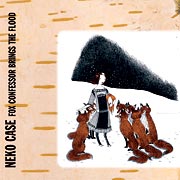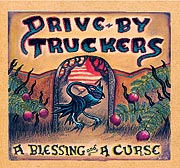Her jingly waltz about her decaying hometown spins hollow, like a smashed-out barber-shop pole: “Thrice All American,” an ode to Tacoma, Wash., was probably the least-felt song on What It Sounds Like, the first of No Depression‘s compilation CDs.

In fact, for every fan who worships Neko Case’s uppity-indie-goddess ambience, there’s a critic eager to fault her emotional reserve.
Pitchfork has called her air one of “mannered meticulousness,” while Rolling Stone went for “preciously arty.”
And “that’s totally OK,” says Case, a proud Virgo who’s actually quite gracious, at least by cell phone. “I can see where [critics] would get that.” Confessional, she says, just isn’t her style.
“I don’t write songs about me,” the singer explains. “They are not assigned a gender or a place or a time. I leave it open.”
But not unlike Aimee Mann, who thawed to genius effect on 2004’s The Forgotten Arm, Case, on last year’s Fox Confessor Brings the Flood, has likewise come in from the cold—and just as stunningly. (Note to astrologers: Both women were born on Sept. 8, a decade apart—Mann in 1960 and Case in 1970. This may be significant.)
Always exhibiting noirer-than-thou cachet whether she’s teamed with a band (the Sadies, the New Pornographers, Her Boyfriends) or doing it herself (2002’s Blacklisted, a record that lived up to its title in myriad ways), Case hasn’t compromised her crystalline vocals or aching worldview after 13 years in music. On the acclaim-strewn Fox, she’s still narrating the darkness from an arch distance. (Is it her Ukrainian heritage? Her long years in Canada?)
For the first time, though, the listener is permitted to ride along—in the darkened backseat, at least, if not shotgun. Plush tiers of harmonic layering are coupled with urgent poetics in songs like the folkloric title track:
“Driving home, I see those flooded fields
How can people not know what beauty this is
I’ve taken it for granted my whole life
Since the day I was born
… What purpose in these deeds
Oh Fox Confessor, please
Who married me to these orphaned blues:
‘It’s not for you to know, but for you to weep and wonder,
When the death of your civilization precedes you.’”
“Star Witness” and “That Teenage Feeling” both bespeak regret of the passionate, cinematic, only-in-hindsight variety—while “The Needle Has Landed” and the brilliant “Hold On, Hold On” register more mid-level ennui. In the latter song, Case’s character melodically intones: “I leave the party at 3 a.m./ Alone, thank God/ With a Valium from the bride/ It’s the devil I love/ And that’s as funny as real love/ And that’s as real as true love.”
Yet for all its dark worriment, Fox is also humorous and hopeful. It knows it’s great—Case’s triumph gleams through it like the second line of a jazz funeral. She says she’s been writing a lot of love songs lately. And, when asked about the importance of place as a songwriting influence, Case refers not only to her Pacific Northwest raising grounds but also, amusingly, to the childhood times she spent with her grandmother, who watched a lot of TV shows set in the 1920s and ‘30s.
“I thought if I went to a certain city, people would be dressed like gangsters,” she says. “I thought those particular time periods were still going on.”
And so they may be. But no matter if she’s singing about the “fox confessor” of old Ukrainian mythology or certain ill-fated doings inside a ‘69 Falcon sedan, Case doesn’t cop to any kind of premeditated nihilism.
“I get the reputation for being dark, but my records have lightened up,” she insists. “I’m a happy person. I have a good home life; I have my band family. Everything’s cool.”
In fact, it’s even better than that: “Everything’s great.”
Flannery O’Connor, another writer burdened with the Gothic yoke, once remarked about her own writing style: “I don’t know so well what I think until I see what I say; then I have to say it over again.”
Case’s own process sounds the same: “In the beginning,” she says, “I have no f**kin’ idea what I’m doing. Then, two thirds of the way into [writing a record], you figure out what you’re obsessed with.” Which was “mythology and folklore in general,” as far as Fox goes.
“It was really showing up,” she stresses. “I had all these ideas that wouldn’t leave me alone.” But her seemingly random inclusion of an interpretive gospel traditional (“John Saw That Number”) happened for no heavy reason.
“I thought the poetry was beautiful,” she says simply. And the resulting song soars; it almost sizzles. After all, any artist culling lyrics from “Revelations” could scarcely be called icy.
What it looks like
Neko Case says she was never that fond of the designation “alt-country”—a domain of which she was/is the arguable queen, and a category now about as limp and unnecessary as yesterday’s cheese fries.

But she never sweated it, either.
“It just sounds so abbreviated—but there’s no point in being mad about it,” she says agreeably. “Whoever came up with the term was not doing musicians a disservice; journalists and musicians need each other. I always thought, it’s just nice that they’re writing about the show.”
However, she will concede, “I’ve never known any musician who ever liked [the term].
“Non-mainstream country music as an entity is a large, undulating umbrella,” she adds.
So why try to define it?
Well, if the alt-country sound could never quite be captured and branded, at least musicians plagued by the tag (we’ll say any act that ever appeared in No Depression) have moved toward an approximation of how left-of-Top-40, roots-ish music might visually manifest itself. For instance: Julie Morstad’s Edward Gorey-ish pictures for the cover of Fox Confessor do more to pinpoint the CD’s feel than 10,000 words from venturesome music journalists. (If you want a dose of the art without buying the disc, check out the breathtaking image on the home page of nekocase.com.)

The Vancouver artist, who’s illustrated for BUST magazine and designs her own line of wallpaper, draws arresting, gently morbid allegorical scenes that manage a Brothers Grimm-ish moral certainty sewn up with a pure feminine edge. About Morstad’s illustrations for Sara O’Leary’s children’s book When You Were Small, Amazon.com reviewer E.R. Bird noted: “We rarely see such delicate, perfectly rendered pictures in our American bookstores and libraries. There’s a picture of [main character] Henry standing astride a beautifully penned cat. Every hair of that cat is meticulously placed. … Morstad could make even [Czechoslovakian children’s-book illustrator] Peter Sís look like a thick-penned schlub …”
Wes Freed is another illustrator whose close work with an alt-whatever band—in this case, Southern rockers the Drive-By Truckers—has developed into a symbiotic necessity. (Freed is called an outsider artist, but in fact he holds a fine-art degree.) Who can picture the Southern Rock Opera album cover without the owl? Or any of the three subsequent CDs (Decoration Day, The Dirty South, A Blessing and a Curse) without Freed’s rich, ominous-humorous, Gothic-playground collection of images? A central figure is that knobby-kneed, drunken-looking vulture Freed calls his “death bird.”
The use of evocative illustration to add mise-en-scène to a body of music speaks well of multimedia collaboration, especially when the alliance is fairly balanced: A cool cover helps sell a good CD; a talented visual artist gains notoriety; the consumer liberated of her $20 gets something nice to look at as well as to listen to.
That, and quality art somehow makes the “Merchandise” link on bands’ Web sites less offensive. Hold tight to your budget when you check out the memorable posters for Case’s current tour. And regarding T-shirts: It’s one thing to be asked to pay good money for a boring Beefy-T with the band’s name lazily printed across the chest—and quite another to acquire, say, Freed’s “Death Bird Baby-Doll Shirt,” an item once offered by the Drive-By Truckers’ merchandiser. (When are they going to bring that back, by the way?)
Neko Case plays The Orange Peel (101 Biltmore Ave.) on Wednesday, April 11, with the Jon Rauhouse Quintet. 9 p.m. $18/$20. 225-5851.



Before you comment
The comments section is here to provide a platform for civil dialogue on the issues we face together as a local community. Xpress is committed to offering this platform for all voices, but when the tone of the discussion gets nasty or strays off topic, we believe many people choose not to participate. Xpress editors are determined to moderate comments to ensure a constructive interchange is maintained. All comments judged not to be in keeping with the spirit of civil discourse will be removed and repeat violators will be banned. See here for our terms of service. Thank you for being part of this effort to promote respectful discussion.